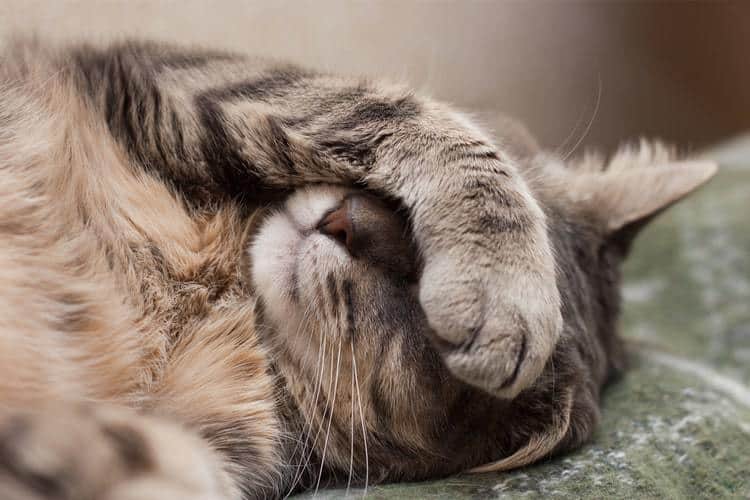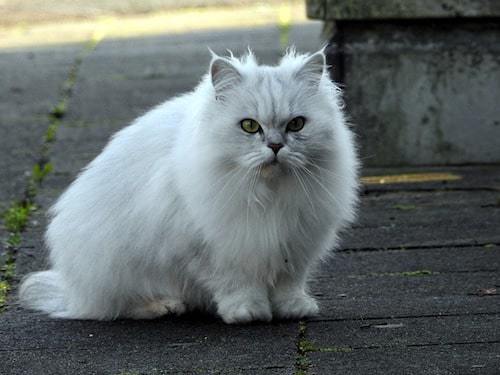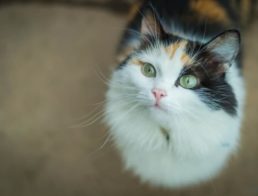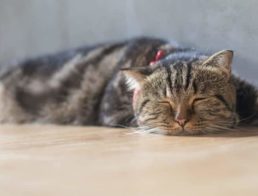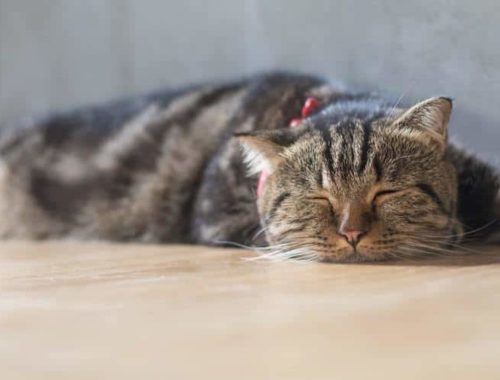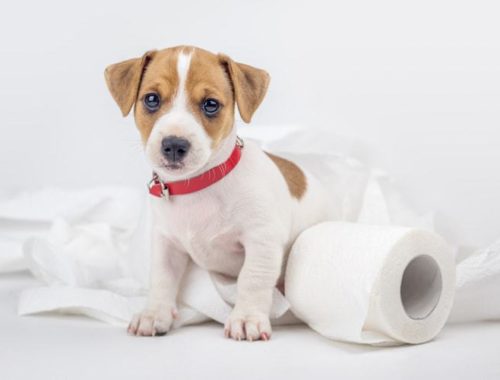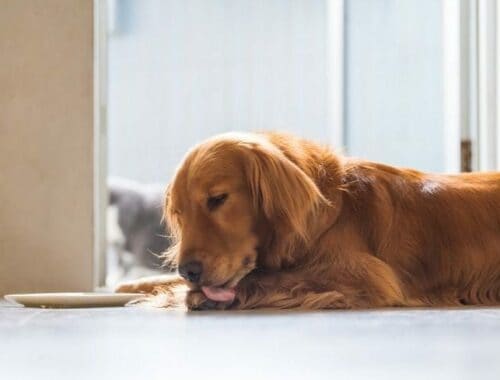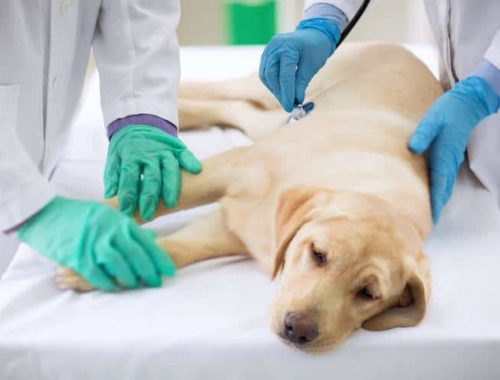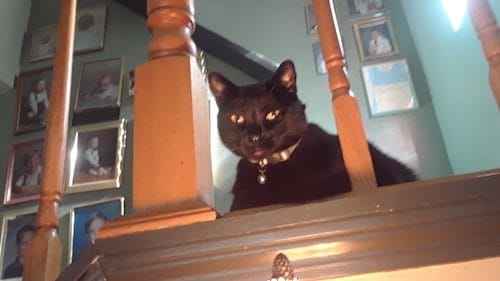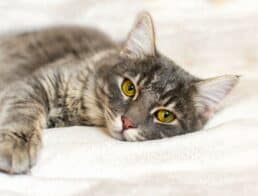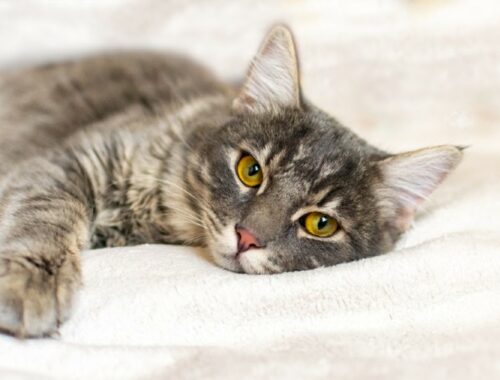Constipation is a condition in cats where they have trouble emptying their bowels and is usually associated with abnormally hard feces. Constipation happens occasionally even in healthy cats, but when it happens more than once a month, there may be a more serious problem. Let’s discuss why cats get constipated and what can you give your cat for constipation.
Constipated Cat Symptoms
No Poop in the Litter Box
Most cats have one or two bowel movements each day. Normal cat feces look like Tootsie Rolls with the size depending on diet and individual cat characteristics.
If you notice fewer or smaller/harder feces when you clean your cat’s litter box, he could be suffering from constipation. The other possibility is that he’s pooping somewhere besides the litter box, so make sure you look around your house!
Abnormal Behavior in Litter Box
Most cats have a more rounded back when they’re pooping and a flatter back when urinating. A cat with a rounded defecating posture for more than a couple of minutes in the litter box is a sign of constipation.
A few other abnormal litter box behaviors include crying, digging in the litter for a long time, or throwing litter outside the box. Pooping over the edge of the box and even leaving feces in other areas of the house could be caused by constipation.
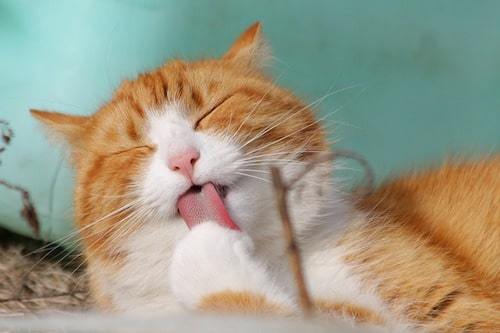
Causes of Constipation in Cats
Occasional, brief bouts of constipation in cats are no cause for alarm. However, there are many underlying diseases that can cause chronic constipation including:
- Kidney disease and hyperthyroidism. Kidney disease and hyperthyroidism are prevalent in senior cats. You’ll need your vet’s help to get a diagnosis.
- Osteoarthritis. Pain in the spine or joints makes it hard for cats to take the right posture to defecate. If cats are “holding it” for long periods because it’s too painful to poop, the feces will dry and harden in the colon.
- Inflammatory bowel disease. IBD is a serious immune-mediated disease marked by inflammation in the digestive tract. A hallmark of IBD is constipation.
- Abnormal anatomy. Cats can be born with abnormal anatomy or develop it as they age. Abnormalities include megacolon, colon polyps, colon strictures, and tumors.
- Drugs. Medications of concern include anesthetic and pain medications, barium used during x-ray studies, iron supplements, diuretics (Lasix), antihistamines (Benadryl, etc.), sucralfate, and antacids. Ask your vet before stopping a prescription medication.
- Anxiety. Cats in a new home, boarding, or with inter-cat aggression issues become constipated when they don’t move their bowels regularly due to anxiety. Check out the Indoor Pet Initiative website for help with anxiety in multi-cat homes.
- Excessive fur ingestion. Cats ingest a lot of hair in the normal course of grooming themselves. When cats are over-grooming or have too much hair to remove, constipation can result.
Home Remedies for Constipated Cats
Diet Changes
Make any diet changes gradually over a period of a week to avoid an upset stomach.
- Moist food adds liquid to the digestive tract and helps feces pass more easily.
- High fiber, “low-residue,” or hypoallergenic foods may be helpful. Ask your vet for help in choosing a good food for your cat.
Laxatives
- Fiber
Vetasyl is a psyllium supplement made specifically for pets. You can open the capsule and mix it with moist food. Alternatively, add a tablespoon of canned pumpkin to your cat’s food a couple times a day.
Miralax is a human remedy that works well for constipated cats when administered at a rate of 1/8 –1/4 tsp in food twice daily. Don’t use it if you suspect a complete bowel obstruction.
- Cat laxative gels
Lax ’aire and Laxatone are lubricant-type laxative oral gels that are safe and effective as a preventive and treatment for cat constipation. Mineral oil and olive oil are not recommended due to the danger of inhaling mineral oil and the high dose of fat in olive oil causing digestive upset.
Enemas
I don’t recommend cat owners give enemas at home. Most cats struggle and you could cause damage to delicate tissue if you’re not trained in this procedure.
Probiotics
Increasing the beneficial bacteria in your cat’s GI tract might be helpful in treating constipation. Try mixing Proviable DC or Fortiflora with one meal a day for at least 14 days.
Weight Management
Overweight cats are more likely to become constipated. Reduce your cat’s weight by feeding a weight loss food, cutting back on excessive treats, and increasing exercise.
Exercise and Environmental Enrichment
Increasing mental stimulation and physical exercise can help all body functions work better. An easy way to improve a ho-hum life is to add some fun cat furniture and interactive toys. Visit the Indoor Pet Initiative for advice on making your cat’s indoor life more fun.
When to Seek Professional Help
It’s reasonable to treat occasional constipation in an otherwise healthy cat at home. However, there are times when you need to seek the help of a veterinarian:
- No BM in two or more days.
Even if your cat is acting pretty normal, no stools passed for two or more days is cause for a vet visit.
- Throwing up.
Vomiting can happen as a result of prolonged constipation or may be a symptom of a more serious condition.
- Not eating normally.
Decreased appetite or not eating at all is a cause for concern. Don’t wait to see a veterinarian if your cat has gone more than 24 hours without eating or if her appetite is less than normal for over three days.
Disclaimer: Content is for informational and educational use only and should not replace professional veterinary advice.
Featured Image Credit: Katerina Maksymenko, Shutterstock


